
By Donald H. Harrison

SAN DIEGO – Contributors and creators of Maggid Comics, a new monthly magazine collection of Jewish-themed comics, pondered during a Comic-Con panel Friday such questions as what Jewish stories are, and which, among them, are their favorites.
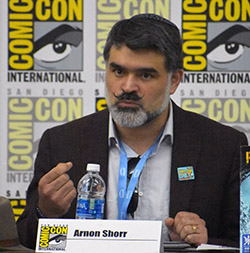
Arnon Shorr is the editor-in-chief of the start-up publication named for itinerant story tellers who specialized in relating tales from the Torah. He surprised his audience when he suggested that Jurassic Park was a Jewish story, and, no, not because Steven Spielberg produced it, and, no again, not because he thought dinosaurs were Jewish.
“It took me decades to realize this, but Jurassic Park is a Golem story, a story about people aspiring to do what God does: to achieve an act of creation, and some of the consequences of achieving this,” he said. “I have always been struck by this notion of creation and creativity as a divine act and also something that we are compelled to do. We are exhorted to be like God, to be godly in some way, and I see that as a commandment to be creative. The whole tension of the Golem narrative is the tension between our sense that we are expected to be creative and yet there seems to be a fuzzy line somewhere that we are not supposed to cross. We don’t know exactly where that line is.”
The Golem was a legendary monster created by Rabbi Judah Loew, the Maharal of Prague, to protect the community. It was strong, but dangerous, and eventually Loew had to decommission it. Literary scholars believe the tale inspired Mary Shelley’s tale of Dr. Frankenstein and his monster.
“Golem legends, however reinterpreted and redefined over the years, are a point of contact in my work,” Shorr added during the panel discussion.
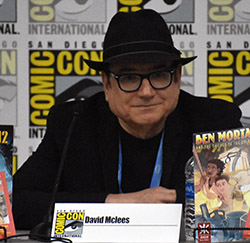
David McLees, another executive with the start-up magazine, commented that Superman is one of his favorite Jewish stories. “He is nerdy; he has a secret identity; he struggles with assimilation into American culture; he came on a rocket ship, which is like Moses who came in a basket. …” He noted that Jerry Siegel and Joe Shuster, the creators of the Superman character, made him “mild mannered but he really has all this power and this pent-up stuff.”
Another Jewish story, although the main character was not Jewish, is Schindler’s List, “a story of a non-Jew” whose motivation initially was not so noble but in the end becomes more noble and save lots of Jews,” McLees said. Spielberg was also the producer of that one.
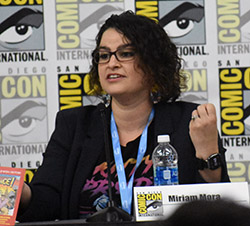
Miriam Mora, a historian with the Center for Jewish History in New York City, named When Do We Eat? about a dysfunctional Jewish family’s Passover seder as one of her favorites. “It felt like my level of Jewish life, a real blend of acculturation, secularism, Americanism, a big family with diversity.”
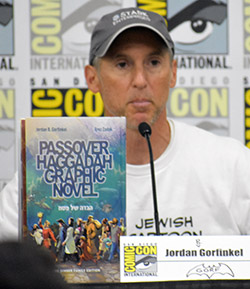
Cartoonist Jordan Gorfinkel, who draws a weekly cartoon at jewishcartoon.com, said he was enamored by a two-part Superman comic book story in which Superman was brought “back in time to confront the Holocaust.” Other of his favorite storiess come from more traditional Jewish sources: The Torah and the Passover Haggadah, which Gorfinkel said he recently has rendered in graphic form.
Panelist Joelle Sellner, who writes stories for animated tales, praised a recent episode of the television series Russian Doll, which she said tells of Jewish generational trauma similar to the experiences of her own family. “My grandmother was 13 years old and escaped the pogroms in Poland and arrived on a boat where she knew nobody and had no money and that made her have severe mental issues, which she passed on to my mother, which she passed on to me. I had never seen that story told in that way … that was what my family is.”
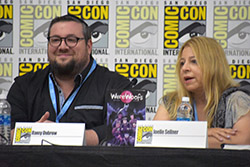
Representations of Jewish women and non-Ashkenazic Jewish ethnicities commanded the panelists’ attention after Ramy Dubrow, another Maggid Comics executive, wondered how many Jewish audience members saw themselves represented in comics.
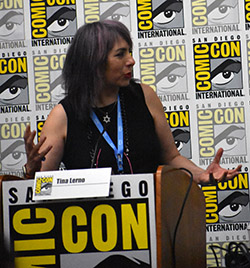
Moderator Tina Lerno said her mother’s family were Iraqi Jews – an ethnicity that she has never seen represented in comic books or graphic novels. “How can we bridge the gap?” she asked.
Mora commented that depictions of Jews exclusively picture Ashkenazim. “In comics right now, we are seeing a trend by non-Jewish writers to make iconic characters Jewish – Batman, who is halachically Jewish. But whenever a character is presented as Jewish, they tend to be secular and Ashkenazi.”
She said that whereas non-Jewish writers are trying to be more inclusive, they don’t realize that Central and Eastern European Jews (Ashkenazim) are but one slice of the Jewish world.
“I think there is a problem of a lack of Jewish female creators writing about the breadth of the female Jewish experience,” Sellner commented. “It falls into tropes where you have the Orthodox woman who is trapped in a repressive culture trying to get out, or you have the adorable bubbe, or the nagging, shrewish Jewish wife. I’m not seeing a lot of great Jewish role models for women in the media right now.”
Shorr shared that “one reason I am excited to be doing Maggid Comics is that … it will have a whole bunch of stories in it, which means that every month there will be an opportunity for new expressions of what it means to be a Jewish story, or character, or theme. … It can be deeper, broader than what we have now, a platform for developing those stories.”
Dubrow commented that one can be Jewish without being religious. He told of a writer who insisted that he wasn’t Jewish because he made a point of eating pork on Yom Kippur. To which, a Jewish friend replied: “You are more Jewish than I am” because the pork-eater always remembered the Jewish holiday.
A woman who identified herself as being Jewish, Latina, and Queer asked how someone like her could be represented in Jewish stories. Shorr, the Maggid Comics editor responded, “You are coming with lots of different backgrounds, a classical American salad. So, you can illustrate your identity.”
“The end goal,” said Meera, “is to write whatever comic you want. You put it out there and it is accepted and understood.”
*
Donald H. Harrison is editor emeritus of San Diego Jewish World. He may be contacted via donald.harrison@sdjewishworld.com